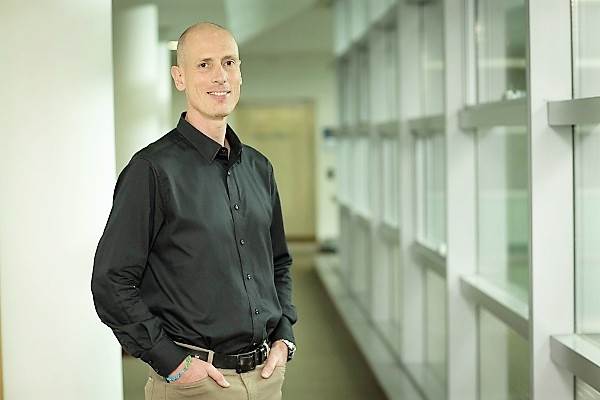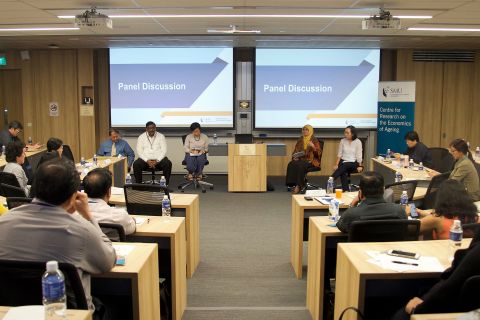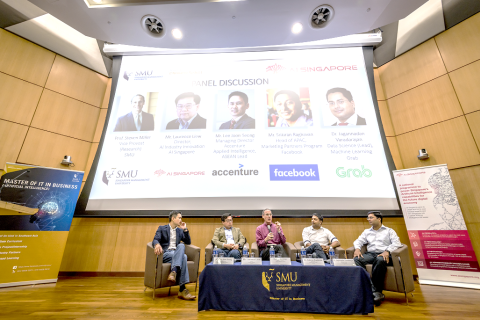
By Sim Shuzhen
SMU Office of Research & Tech Transfer – For many fresh graduates, stepping off-campus and into the real world can feel like a plunge into a pool of ice-cold water. Aside from the pressure of building a career, many twenty-somethings soon realise the importance of keeping to a budget, saving up for a house and maybe even starting to put aside money for retirement – in short, learning to ‘adult’.
In Singapore, help is at hand for the bewildered, thanks to the Financial Literacy Programme led by the Sim Kee Boon Institute for Financial Economics (SKBI) at Singapore Management University (SMU). Supported by the Citi Foundation, the programme has since 2012 taught more than 18,000 students and young adults about money management and making good financial decisions.
The programme is just one of many finance- and economics-related initiatives – ranging from training programmes to economic surveys to the creation of an index for cryptocurrencies – started by SKBI. The think tank, which celebrates its tenth anniversary this year, focuses on fundamental and applied research relevant to society and the finance industry. It is also the anchor organisation within SMU that spearheads the study of financial economics by championing interdisciplinary research, close collaboration with academics, and education and practice initiatives within the space.
“Financial economics encompasses many current issues which impact society and the economy, such as real estate housing policies in Singapore, the development and implications of digital currencies, as well as new financial tools and products,” says SKBI Academic Director Professor Ekkehart Boehmer.
“Independent research by academic institutions provides impartial views, insights, references and useful information for policy makers, investors, companies, practitioners and individuals,” adds Professor Boehmer, who is also the Keppel Professor of Finance at SMU’s Lee Kong Chian School of Business.
Making an impact with financial research
A 2015 restructuring saw SKBI focusing its research efforts around prevailing socio-economic issues that impact the well-being of Singapore and the region at large, says Professor Boehmer. The late Mr Sim Kee Boon, a distinguished public servant and former head of Singapore’s civil service – in whose honour the Institute is named – would probably have approved.
SKBI is now set up to encourage multidisciplinary research in financial innovation, financial inclusion, capital markets, asset management and corporate finance, with each of these five pillars supported by a working group of SKBI advisory board members and SMU faculty. “The working groups discuss and suggest broad research areas and topics for the Institute, and provide useful insights and networks,” says Professor Boehmer.
Working at the intersection of capital markets and asset management is SKBI Research Fellow Dr Marinela Finta, who studies the international equity and commodity markets. “Given that Singapore is a hub for commodities trading, understanding investors’ preferences is an important topic,” she says.
Investors have preferences not only for the volatility risk but also for skewness, the risk of large declines in financial markets. As such, to bear these risks, investors require a compensation. This ‘skewness premium’ can affect the future value of investment portfolios, since investors typically prefer positively skewed portfolios.
In a study done with Dr José Ornelas of the Banco Central do Brasil, Dr Finta investigated whether the option-implied skewness and its premium (forward-looking measures of investors’ preferences) could be used to forecast commodity futures returns. The researchers found that the positive implied skewness of commodities was indeed associated with positive future returns. “Our findings empirically support the existence of arbitrage opportunities between commodity and derivative markets,” explains Dr Finta, adding that the study is of considerable importance for market participants, policy makers, and academics.
An economist’s take on hot-button issues
Also approaching academic research with a view to societal impact is SKBI Research Fellow Dr Xie Taojun, who studies the welfare effects of monetary and macroprudential (to do with financial regulation) policies. “My research caters to the need of policy makers to consider the overall welfare of society when they design policies,” he explains.
After the 2007-2008 global financial crisis, which was fueled by rampant property speculation and excessive lending, many countries tightened their regulatory regimes to guard against systemic risk. “Singapore was one of the first countries to apply cooling measures to the housing market,” says Dr Xie, noting that the Monetary Authority of Singapore implemented multiple rounds of cooling measures to stabilise property prices.
In response to concerns from the public that the measures were over-cooling the market, Dr Xie and his colleagues studied the impact of these measures on housing wealth in Singapore. “We found that the social welfare of people owning property in the public housing sector was less affected than that of those owning in the private housing sector,” he says. “This outcome fits well with Singapore's intention to ensure that its residents can participate in the country's economic growth by owning public housing. It also indicates that the Singapore authorities targeted the measures successfully.”
Dr Xie is also interested in the social and economic aspects of fintech – an area that is increasingly under the spotlight as new financial technologies like cashless transactions and central bank-issued digital currencies are tested and rolled out. “Technology naturally becomes the main topic of discussion, but few in Singapore are looking at the economic implications,” he says. “Without thoroughly assessing the economic consequences, society may not benefit to the fullest from the new technology.”
To address this gap, Dr Xie is now studying the policy implications of fintech, with the aim of informing policies that will maximise social welfare, he says. “I hope to contribute to the improvement of economic policies in the digital era.”
Bridging theory and practice
Over the ten years that SKBI has been in existence, its researchers and staff have certainly been busy. The Institute’s large and diverse portfolio of initiatives includes the Singapore Index of Inflation Expectations (SInDEx), which informs monetary policy by providing insights into consumer sentiment and expectations; the Asian Financial Leaders Programme for senior executives in the financial sector; and the SKBI annual conference, which brings leading international speakers from academia, industry and government to Singapore each year.
A major challenge for financial researchers, says Professor Boehmer, is that data on financial transactions (such as bank or investment data) are often not publicly available. Here, SKBI’s Advisory Board – which consists of prominent leaders from the finance industry and the public sector – can step up to provide assistance and access to their networks, helping researchers gain access to data from which they can draw novel insights, he explains.
Over the next three to five years, Professor Boehmer has plans to build more impactful collaborations with academic and industry partners. “We aspire to position SKBI as the major think tank which businesses will approach when in need, forming the bridge between theory and practice,” he says.
Meanwhile, SKBI’s multidisciplinary nature, focus on real-world impact and links to industry has already been a boon to researchers like Dr Finta and Dr Xie. “I have always wanted to bridge economic theory with the real world, and SKBI has been an ideal place,” says Dr Xie. “Working under the financial innovation and asset management pillars, I became vigilant to the latest industry developments in these fields. Research ideas can therefore evolve at the same pace as these developments.”
Back to Research@SMU Issue 54
See More News
Want to see more of SMU Research?
Sign up for Research@SMU e-newslettter to know more about our research and research-related events!
If you would like to remove yourself from all our mailing list, please visit https://eservices.smu.edu.sg/internet/DNC/Default.aspx

